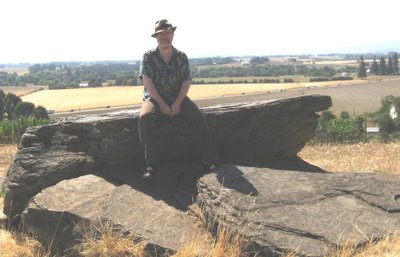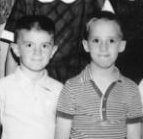On the morning of my birthday, we drove down to the Evergreen Aviation Museum outside McMinnville, OR. Evergreen is the home of the Spruce Goose and it looms over the display area making all the other planes look like toys. A titan rocket and an SR-71 are tucked under one wing while the early history of aviation displays are tucked under the others.
The museum sits in the middle of a vineyard and produces it's own label of wine. After touring the displays, we went to the wine shop for a tasting. The pourer did a great job of chatting up the visitors and was soon asking us about our trip.
"Where are you headed next?" she asked.
"Well," my clever wife started, "we're going to see a rock."
"Oh. Are you going out to the coast to see Haystack Rock?"
"No. This is a big rock by the road. There was this glacier..." She paused. "He better explain it."
It's called the Belleview Erratic (also spelled Bellevue) and technically it's a large chunk of metamorphic argillite. It's a big dark rock, about as big as a mid-size sedan. It's flat and broken into three pieces. It sits on the top of a hill. To the broadly imaginative, a big flat rock sitting on the top of a hill might look vaguely ceremonial. To others, it probably just looks like a good place to stand while taking in a view of the valley. It's not a ceremonial altar. It is in fact, just a rock. What makes it interesting is how it got onto this hilltop in western Oregon.
Those who took a geology class and remember their lessons will know that an erratic is a rock that is out of place. Most famously, erratics are rocks that glaciers carry down from the mountains and deposit in the plains. It was the discovery of erratics that allowed early geologists to conceive of the ice ages and to trace the outlines of the lost ice sheets and glaciers. But the Willamette valley was never glaciated and the Belleview Erratic doesn't come from the surrounding mountains. it is a piece of southern British Columbia and it floated to that hilltop in Oregon.
Toward the end of the last ice age, the Cordilleran Ice Sheet extended across the Canadian border and covered a sliver of northern Washington, Idaho, and Montana. The western part of Montana, between the Continental Divide on the crest of the Rockies and the Idaho state line on the crest of the Bitterroots, is drained by the Clark Fork of the Columbia River. Unlike most rivers in the United States, the Clark Fork flows north. It loops across the Idaho panhandle and joins the Columbia in the extreme northeastern corner of Washington. During the ice age, this loop through Idaho was blocked by the southern tip of the Cordilleran Ice Sheet, a glacier called the Purcell Lobe. Behind the Purcell Lobe all of the drainage of the Clark Fork was damned up eventually to form a Great Lake sized body of water called Lake Missoula. When the lake was full, the future location of the town of Missoula would have been a thousand feet underwater.
The Belleview Erratic probably began its journey in southern British Columbia under the uphill end of the Purcell Lobe. Glaciers are made of snow, normal snow, which fell and covered the ground. When the snow gets deep enough, its own weight compresses it into ice. When a big enough, heavy enough mass of this ice gathers on a hillside, it will start to slowly slide down the hill. At this point, it becomes a glacier.
Hillsides are not perfectly smooth. They have irregularities, such as trees and rocks. As a glacier forms, these irregularities are encased in the ice. They become part of the glacier. When the glacier moves, they move with it. As the front end of the glacier melts, the debris that it has carried downhill are deposited in a disorderly pile. In time this pile forms a ridge in front of the glacier called a moraine. When the glacier retreats, the moraine remains. By following these ridges of erratics--these terminal moraines--geologists can map where the ancient front edges of glaciers were.
At least that's how it usually works.
One day, about fifteen thousand years ago, the Belleview Erratic was nearing the end of its glacial journey. It had been carried from the mountains by one glacier. That glacier joined with others to form the Purcell Lobe and carried the Belleview Erratic south into Idaho. As it neared the front of the glacier, to be deposited in the moraine something new happened.
The water that had been gathering behind the glacier reached a critical depth. At that end of the lake, the water was almost two thousand feet deep. The pressure at the bottom was enough to force its way under the glacier. In a few hours time, the water floated the southern tip of the Purcell Lobe and began to rush out under it. The glacial dam collapsed and was torn apart by the rushing water (the link leads to an impressive animated view of the collapse). One piece of glacier, carrying the Belleview Erratic, became an iceberg and floated away on the flood.
The Lake Missoula Flood is the biggest flood ever discovered. In eastern Washington, it tore up entire counties worth of topsoil and carried them away. In parts of the Columbia valley it passed as a five hundred foot high wall of muddy water traveling up to one hundred miles per hour. It pushed hurricane force winds ahead of it. The water itself was a churning brown mass the color and texture of a runny chocolate milkshake. It carried with it topsoil, rocks, trees, entire herds of mammoths, and the icebergs that had formerly been part of the Purcell Lobe. For two weeks, the Columbia carried several times more water than all the rivers in the world combined.
Where the flood ran into narrows, especially on the Lower Columbia, it backed up to form gigantic temporary lakes. These lakes backed up side valleys and there, when the water slowed down, it deposited some of its load of soil and rocks. The topsoil of Eastern Washington has made the valleys of the Yakima, Walla Walla, and Willamette some of the most productive agricultural area in North America, especially for wine.
The Belleview Erratic was carried into Lake Allison, the temporary Lake that filled the Willamette valley. South of Portland, it would have been out of the most active part of the flood. The waters would have grown calmer as the iceberg drifted south and finally ran aground on a submerged hill. After a few days, the waters would have receded leaving the iceberg stranded. Then the iceberg melted and there was just a big, dark rock on a hilltop.
The Lake Missoula flood wasn't a singular event. After the waters rushed out, the Purcell Lobe pushed forward and blocked the Clark Fork valley again. The river backed up and formed a new lake. After forty or fifty years, it was deep enough to float the glacier again and flood the Columbia again. This cycle dominated the Columbia valley for over two thousand years, there is sedimentary evidence of between forty-one and eighty-nine floods, although at least two came from lakes other than Lake Missoula. No one knows which flood brought the Belleview to its current home.
After we left the Evergreen Aviation Museum, my clever wife and I traveled west on Highway 18. A geology book I brought along said the rock was on the north side of the highway, just before Sheridan. We scanned the hilltops. We had a picture that showed above and behind a small white farmhouse. We hoped to recognize the farmhouse.
The Oregon Department of Highways has put up nice blue signs pointing out all the vineyards, especially the ones with some kind of tour or gift shop. On the signpost for Oldsville Road was a sign for Yamhill Valley Vineyards. Beneath it was a small, brown, older style sign that said simply "Glacial Rock."
We passed it doing fifty. I turned around about two miles down the road and came back. Oldsville Road immediately forked with one fork paralleling the highway and one heading into the hills. The highway was visible in our picture, so I took the road closest to it. I saw a brown sign behind some trees and thought, "Aha, that must be a Park Service sign." It wasn't, it was the winery. We followed the road a little further. It approached the highway and then swerved away. In the crook of the curve was another little, brown sign. This one said "Glacial Erratic Rock" and it marked a trail. The road was widened to create two parking spaces across from the sign. We looped around and parked.
Beneath the sign was a Park Service plaque explaining about the Lake Missoula flood. The trail followed a fence line. On one side the owners had planted Pinot grapes. There were ripe grapes on the vines. Blackberries grew along the fence. This is a noxious invasive species in the Northwest, but the berries were ripe and we picked a few as we climbed. It was a hot day and the trail was steep, but it was also short and there was a breeze. The trail went under a tree, rounded a bend, and approached the hilltop. And there it was--a big, dark rock. It's not as impressive in real life as in the pictures.
The Bellevue Erratic is the largest erratic in the Willamette valley. Unfortunately, since it was identified in the 1950's, tourists have been plucking pieces off it for souvenirs. When first measured, the scientists estimated it at one-hundred-sixty tons. In 1980, they estimated it at ninety tons. Today, about forty tons are left. For fifteen thousand years it sat unmolested in anonymity. Fifty years of marginal notoriety are all that it has taken to nearly destroy it.
In a few years I suppose the last significant chunk will be carted off to a museum, where it will just be another rock with a label. Although the best museum might provide the rock with an exciting display--a mural background, a diorama, or sophisticated animation showing how it got there--they will never be able to capture the experience of sitting on the rock in the very place where it was deposited fifteen thousand years ago feeling the sun and the air and trying to strip away the effects of time and man on the valley.
I sat on the rock for a few minutes and tried to imagine its journey. I looked across the valley at the Cascades trying to pick out our altitude on the other side, trying to picture what the valley looked like with all that water. I felt the heat that the morning sun had imparted to the rock. I thought of the other people who had done the same thing. Then we were on our way.
When we left, we only took pictures and blackberries with us. I already had all I needed from the rock.

Update: There are several book that at least mention the floods, but these are the two I read before the trip.
David Alt. Glacial Lake Missoula and Its Humongous Floods. Mountain Press Publishing Company, 2003.
John Eliot Allen, et al. Cataclysms on the Columbia. Timber Press, 1986.

